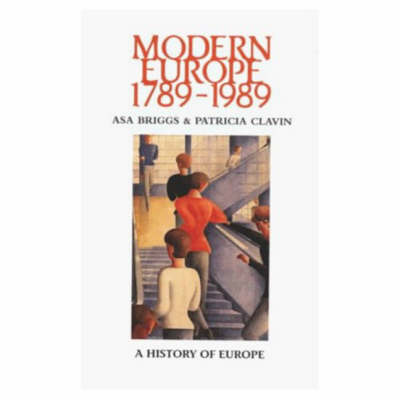Koenigsberger and Briggs History of Europe
1 total work
A History of Europe - H.G. Koenigsberger & Asa Briggs "Modern Europe 1789-1989" is the third and final volume of a major illustrated history of Europe from the collapse of the Roman Empire to modern times. Jointly planned by H.G. Koenigsberger and Asa Briggs, the sequence is designed for upper school, college and university students, and for the general reader. The first two parts - "Medieval Europe 400-1500" and "Early Modern Europe 1500-1789" - were contributed by Professor Koenigsberger; now this eagerly awaited survey of Europe from the French Revolution to the disintegration of the Soviet Empire, in which Asa Briggs has been joined as co-author by Dr Patricia Clavin, completes the series in fine style. While the authors do full justice to the narrative of big events that have shaped the Europe that we see today, they also reach deep below the political surface to examine how European society and culture have influenced, or been influenced by, these developments. They trace the emergence, from the French Revolution onwards, of a distinctive sense of Europe and Europeanness.
At the same time they explore the growth and impact of the new phenomenon of the nation state - one of nineteenth-century Europe's most powerful, and problematic, legacies to our own time. But they go further: alongside these continent-wide and national perspectives, they also explore the development of modern Europe from a regional point of view, within and across the boundaries of her nation-states. This is particularly valuable given the increasing economic and political significance of the European regions today. Similarly, the authors reflect new post-Soviet realities in giving the same attention to the foundations of modern eastern Europe as they do to the more familiar story of the west. Throughout, Britain is treated as an integral part of the European mainstream. Narrative and analysis - national, regional or local - are enriched and enlivened throughout by a wealth of evidence "from below". This is not just the official history of constitutions, institutions and ruling elites.
The authors are alive throughout to the varied fortunes of Europe's diverse peoples and classes - rich and poor, urban and rural, young and old - and, not least, to the changing impact of gender on the ways of life available to them. The product of a lively collaboration between one of Britain's most distinguished senior historians and a notable new voice from the younger generation of scholars, "Modern Europe" is attractively written and richly illustrated. Both text and illustrations draw on a wide rage of sources, from state archives, published memoirs and heroic paintings to private letters, oral testimony, picture postcards, cartoons and songs. The result is a hugely engaging book with all the energy and enthusiasm that we have come to expect of one of history's most masterly communicators. Asa Briggs (Lord Briggs of Lewes) was Vice Chancellor of the University of Sussex (1967-1976), Provost of Worcester College, Oxford (1976-1991) and Chancellor of the Open University (1978-1995). Patricia Clavin is Lecturer in Modern History at the University of Keele.
At the same time they explore the growth and impact of the new phenomenon of the nation state - one of nineteenth-century Europe's most powerful, and problematic, legacies to our own time. But they go further: alongside these continent-wide and national perspectives, they also explore the development of modern Europe from a regional point of view, within and across the boundaries of her nation-states. This is particularly valuable given the increasing economic and political significance of the European regions today. Similarly, the authors reflect new post-Soviet realities in giving the same attention to the foundations of modern eastern Europe as they do to the more familiar story of the west. Throughout, Britain is treated as an integral part of the European mainstream. Narrative and analysis - national, regional or local - are enriched and enlivened throughout by a wealth of evidence "from below". This is not just the official history of constitutions, institutions and ruling elites.
The authors are alive throughout to the varied fortunes of Europe's diverse peoples and classes - rich and poor, urban and rural, young and old - and, not least, to the changing impact of gender on the ways of life available to them. The product of a lively collaboration between one of Britain's most distinguished senior historians and a notable new voice from the younger generation of scholars, "Modern Europe" is attractively written and richly illustrated. Both text and illustrations draw on a wide rage of sources, from state archives, published memoirs and heroic paintings to private letters, oral testimony, picture postcards, cartoons and songs. The result is a hugely engaging book with all the energy and enthusiasm that we have come to expect of one of history's most masterly communicators. Asa Briggs (Lord Briggs of Lewes) was Vice Chancellor of the University of Sussex (1967-1976), Provost of Worcester College, Oxford (1976-1991) and Chancellor of the Open University (1978-1995). Patricia Clavin is Lecturer in Modern History at the University of Keele.
